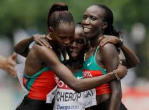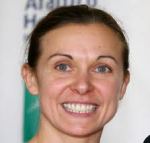WOMEN'S TEAM COULD YIELD MEDAL THREATS
WOMEN'S TEAM COULD YIELD MEDAL THREATS
WOMEN'S TEAM COULD YIELD MEDAL THREATS

 In an age where even reality has been reduced to another manufactured or processed product, where the words and actions of our elected leaders are marbled with hidden agendas and corrosive half-truths, sport seems the last vestige through which to experience an Ivory-Soap version of truth as a by-product of pure effort.
In an age where even reality has been reduced to another manufactured or processed product, where the words and actions of our elected leaders are marbled with hidden agendas and corrosive half-truths, sport seems the last vestige through which to experience an Ivory-Soap version of truth as a by-product of pure effort.
Here we are less than a week out from the 2012 U.S. Olympic Marathon Trials in Houston, Texas. In a few short days all the hard work, all the sacrifice of the last year, or more, will be born to the starting line by men and women hoping for the stars to align with fate in an expression of human performance. It is on just such occasions that magic can happen – ask Ryan Hall – which is why sport continues to hold us unyieldingly in its thrall.
*****
Though Kenyan women swept the podium at the IAAF World Championships Marathon last summer in Daegu, South Korea, at least one, if not more, of the U.S. women who emerge from next weekend’s Olympic Marathon Trials in Houston must still be considered a medal contender in London 2012. Which is why the women’s race may hold even greater significance in the big picture than the men’s race. There will be a fine field toeing the men’s line in Houston, but the chances of one of them standing on the Olympic podium in August is significantly less probable than their female counterparts. Here’s why.
First, the Kenyan women, though excellent, are nowhere near as dominant as their men. This, too, may change in the future, but at present the opportunities for girls to explore their individual talents in Kenya trail that of boys significantly due to still-standing cultural norms. This leaves the door ajar for women from many other nations to be in contention for Olympic Marathon medals.
Secondly, among the contenders in Houston, Deena Kastor, Shalane Flanaganand Kara Goucher are already proven internationalists with Olympic and World Championship hardware to prove their bona fides. Though Deena may be past her prime, the 2004 Olympic Marathon bronze medalist and American record holder has experience too vast to dismiss. She isn’t being touted to make the team, and so is playing with house money. The pressure falls on everyone else, and Kastor can race easy of mind, a big advantage in the hothouse atmosphere of a Trials. She knows how to win, how to push, how to hurt. It’s a matter of having enough training beneath her after the birth of daughter Piper Bloom last February and the fragility of her body 11 years after her debut in New York way back in 2001. Since breaking a bone in her foot 5K into the 2008 Olympic Marathon, she hasn’t been the same runner she was before. She has had a good build up, but no one has yet managed three-straight Olympic Marathon teams, nor has anyway whose career debut was eleven years-old has made an Olympic team in U.S. history.
Shalane Flanagan’s 2008 Olympic 10,000 meter bronze and her matching World Cross Country bronze from 2011 are still shiny and polished. If anyone should be considered the favorite, it’s the woman from Portland, Oregon out of Marblehead, Massachusetts and the University of North Carolina. She has the pedigree, as Dad Steve was a member of the Colorado Track Club in their 1970s glory years with Frank Shorter, and Mom Cheryl once held the women’s marathon world record. And since joining Jerry Schumacher’s group in Portland, Oregon 2 1/2 years ago, Flanagan has rebuilt herself into more of an all-around distance runner rather than the track and cross country star she arrived as. Add on a solid second place debut in the 2010 ING New York City Marathon, and you have the recipe of a Trials favorite.
In between Kastor and Flanagan stands Flanagan’s new teammate with the Oregon Track Club, Kara Goucher. That long-time rivals would decide to join forces is a testament to the world-class goals of both women. Rather than maintain their independent fiefdoms, Goucher and Flanagan both knew they, along with training partner Lisa Uhl (nee Koll), could lift one another to the higher realms necessary to continue mining international medals.
True, Kara’s World Championships 10,000-meter bronze from Osaka 2007 carries a little more dust than Flanagan’s hardware, but her close friendship with marathon world record holderPaula Radcliffe of England is a settling and inspiring influence on an athlete who brings as fierce a competitive drive to Houston as any athlete, male or female. That husband Adam announced his own retirement in recent months after chronic injuries kept him from achieving what would have been a career on par with Meb Keflizighi and any of his contemporaries, only fuels his wife’s ambitions for the family that much more.
Additional motivation will come from Goucher’s gutsy but frustrating fifth place 2:24:52 at theBoston Marathon this spring just seven months after the birth of her son Colt. Frustrating in the sense that as Kenyans Caroline Kilel, Sharon Cherop, and Caroline Rotich along with America’s Desi Davilapulled away mid-way through the race, one had the feeling, even at the time, that Kara felt if only she had another month’s training in her legs…
“We’ve yet to see the full Kara,” said one pundit. “She’s always been coming back from injury or pregnancy.”
And so it is again for the Trials. Goucher has had to ramp up cautiously coming off a summer hip injury. So though she and Flanagan train under Jerry Schumacher, they haven’t been able to do the same level of training. Their hope is to both make the team, then begin the big buildup to London matching strides along the way.
For her part, Desi Davila is a throwback to one of America’s great initial Running Boom champions, Patti Catalano. A one-time cigarette smoking candy-striper, Patti never did run competitively in school, and only took up the sport to lose weight and try to quit smoking. When after only six months of training she won the Newport Marathon in 2:50, she discovered a reservoir of hidden talent that led to three Boston Marathon runner-up finishes, four Honolulu Marathons titles, and the first women’s sub-2:30 marathon in American history. Only the presence of another native New Englander, Olympic queen Joan Benoit Samuelson, caused Patti’s star to shine less brightly.
While Desi may not have quite the rags-to-riches story of Patti (now Dillon) – after all, she did compete in high school in Chula Vista, California, and was a solid team member for Arizona State - nobody expected her to rise to runner-up status at the Boston Marathon at 2:22:38, or hold co-favorite standing in Houston to earn a berth to London 2012. Her steady progress over the years under the hand of Keith and Kevin Hanson of the Hanson-Brooks Distance Project has been a text book example of building a powerful structure one meticulous level at a time.
Davila never catapulted to stardom. Instead, she ground out the miles, and sharpened her edges on the track, constantly improving year in and year out. In 2008 in just her second marathon at the Boston Olympic Trials she learned valuable lessons in the mental game of Trials racing. Though up as high as fourth and moving in on third for a spell, she faded back to 13th in 2:37:50. She’ll not come unhinged in Houston. She will respect all, but fear none. And they best keep an eye close on her. She races like first is just another place, but this will be her first major marathon where she is expected to finish high. How will that effect her?
As coach Kevin Hanson told RW: “The thing with Des is that when she ran 2:26 in Chicago (2010) she was a 32:30 10K runner. When she knocked her 10K time down to 32:05 she was able to do what she did in Boston (2:22:38, 2ndplace). She has now knocked it down to 31:37, so you can see the trend where she gets faster in other distances and that transfers to the marathon.”
- Another mother (and 2008 Olympian) who’s been on a constant improvement trajectory has been Magdelena Lewy-Boulet out of Oakland, California. The Polish born Magda, like Desi, has just kept getting better as those around her improve. Their new track PRs indicate that can run fast efficiently, and having made the team in 2008 at the Boston Trials, Magda has the mental and physical tools to compete again in 2012.
While the men have the intriguing wild cards like debutants Brian Olinger, Brent Vaughn, and Mo Trafeh, the women are led by a host of favorites, and a few up-and-comers who may rise enough in Houston to fly all the way to London.
Flagstaff’s Stephanie Rothstein came out of nowhere in Houston last January to take second place in 2:29:35. Amy Hastings (Arizona State teammate of Desi Davila) battled a biblical downpour in L.A. last March to post a second-place 2:27:03 debut, then made the World Championships final in the 5000-meters. Her improvement curve could be as steep as anyone’s. Kenyan-born Janet Cherobon-Bawcom will make her first serious attempt at the marathon in Houston, but has a string of U.S. national road titles and 1:11 halves to bolster her confidence, and Morgantown, West Virginia’s Clara Grandt posted a sub-2:30 in Boston (though in 16th place) to enter the sweepstakes as an outside contender. Threee-time Olympian (10,000, marathon, 5000) Jen Rhines, 2008 marathon Olympian Blake Russelland former track 10,000m standout Katie McGregor have all the savvy. Can they put it all together for one last hurrah?
But it remains Flanagan, Goucher, Davila, and Boulet who have shown the most consistency at the world levels track to marathon. Shalane has four of the top ten qualifying performances in the field – including marathons, half-marathons, and 10,000m track performances. Kara holds three top qualifying performances. The USATF 10,000 meter championship in Eugene last summer would not be a bad indication of how the talent shakes out in Houston - with Amy Hastings as the threat.
- Shalane Flanagan - 31:59.97
- Kara Goucher - 32:16.65
- Jen Rhines - 31:30.37
- Desi Davila - 31:37.14 PR
- Magda L-B - 31:48.58 PR
By its very nature, this first-ever double Olympic Marathon Trials – men’s and women’s simultaneously - will unleash an abundance of kinetic, psychic, and emotional energy. The quadrennial scheduling of its occurence makes it unique. The consequences of its outcome mark it as hallowed.
At this time, in this place, by this task, for these colors:
“Ladies and gentlemen.” Take your marks.”

More athlete blogs for Olympic Marathon Trials





